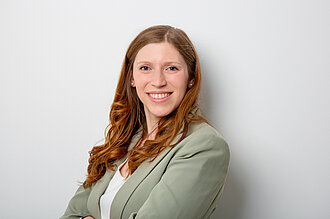Marina Rößner

What excites you about adult learning and education? Why did you choose to do research in the field of adult learning and education?
In the German discourse, education is mostly a school-related topic. However, I am convinced that education is a central component of life as a whole and must therefore be considered throughout life. I am particularly interested in how people who have difficult access to education can participate in adult education. As education is fundamental to participation in society, it is essential that all people (e.g. people with a lower socio-economic status, immigrants and asylum seekers, people with disabilities, etc.) can participate. That is why it is important to me in my research to advance this topic and provide important findings for the field of practice so that all adult eduation is accessible and inclusive for all people.
Marina Rößner is a researcher at the Professorship for Adult Education at the University of Duisburg-Essen. Prior to this, she studied education and special education at the Julius-Maximilians-University Würzburg (bachelor’s degree) and educational science with a focus on ‘Participation and Lifelong Learning’ at the University of Hamburg (master's degree). During her studies, she was a student assistant at the Professorship of Adult and Continuing Education at Julius-Maximilians-University Würzburg and a research assistant at the Department of Special Needs Education at the University of Hamburg.
- Inclusive adult education (special focus on people with disabilities)
- Financial literacy for adults
- Adult civic education
- International comparative adult education
CG12: Adult learning and education for all?! Issues of inclusion with regard to disability in the limelight
Co-Moderator: Silke Schreiber-Barsch
The ideology of social inclusion is one of the major leitmotifs of adult education, claiming to provide education for all—and especially for some across adult education’s histories worldwide. However, in particular since the mid2000s, due to the UN Convention on the Rights of Persons with Disabilities (2006), for example, inclusion as a terminology and conceptual approach has increasingly been used to focus on the context of disability and impairment. This has strongly intensified the quest for better access to adult learning and education (ALE). Yet, what learning means in the context of disability/impairment, how it is framed in a nation-state architecture and in ALE institutional settings, and how it is experienced in a certain geographical place and at a given time are very likely to vary. Taking this as a point of departure, the comparative group will elaborate commonalities and differences. Disability/impairment will serve as the main lens of analysis; nonetheless, intersections with other categories will also be considered according to the multi-layered features of inclusive adult education (Schreiber-Barsch & Rule 2021, 553). Practitioners enrich the comparative group with their unique knowledge and experience with regard to the meso-level of institutional settings and strategies of access. The outcome will be a deeper understanding of the buzzword inclusion, greater expertise in analysing the multidimensional concept of inclusive adult education through a comparative lens, and extended experience with strategies of institutional accessibility.
- Rößner, M. (2024). Das Inklusionsverständnis parteinaher Stiftungen in Hamburg – eine Programmanalyse. Erwachsenenbildung und Behinderung, 35(2), 10–20.
- Beu, V., Leibinger, L., Rößner, M. & Egetenmeyer, R. (2023). Ten Years of Adult Education Academy: Contributing to Internationalisation in Higher Education. Bildung und Erziehung, 76(4), 395–413. doi.org/10.13109/buer.2023.76.4.395


